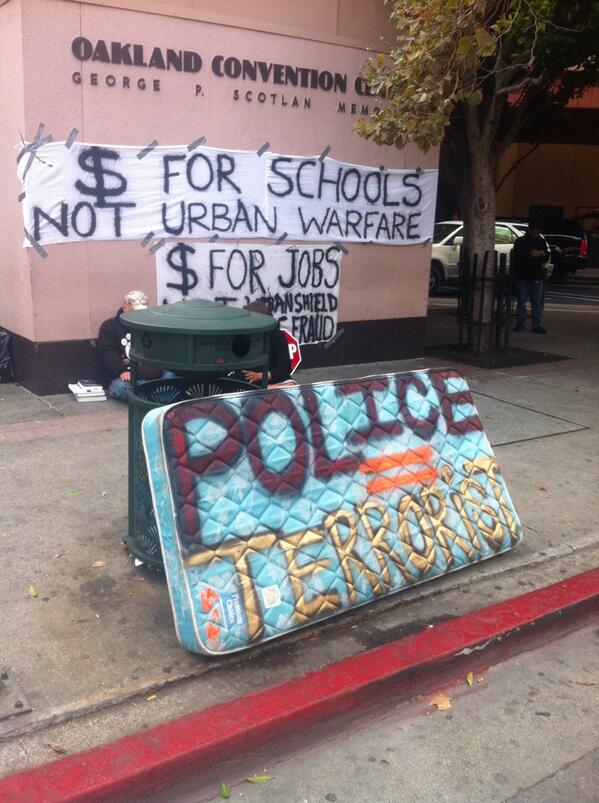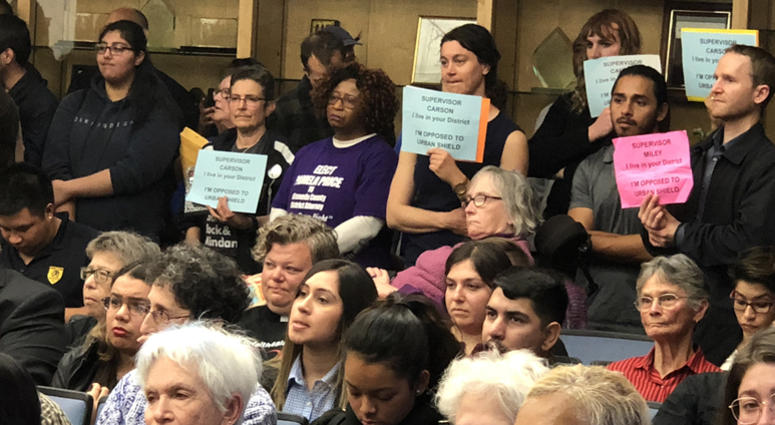
On March 14th, 2019, the Bay Area Urban Areas Security Initiative Approval Authority voted unanimously to take the monies for Urban Shield and other emergency preparedness programs usually distributed to Alameda County and redistribute them around the Bay Area, to San Francisco, the North, East and South Bays.
Sheriff’s spokesman Sgt. Ray Kelly said the vote by the UASI board effectively ends Urban Shield.

Urban Shield began in 2007, organized and run by the Alameda County Sheriff and funded by Homeland Security through its Urban Areas Security Initative (UASI) program. Consisting mainly of SWAT team exercises (held outdoors throughout the Bay Area), a militarized weapons and equipment exposition, and a conference, it grew over the years, attracting participants from around the Bay Area, the United States, and even the world.

It was originally hosted at the Convention Center in downtown Oakland. Mounting protests over its philosophy, purpose, nature and methodologies grew until in 2014 the City of Oakland said it would no longer host the conference and weapons exhibition at its Convention Center.
Protests continued at its new location at the fairgrounds in Pleasanton, CA, while activists began to pursue political solutions – in cities that were sending police teams to Urban Shield and at the Alameda County level. The Alameda County Board of Supervisors (AlCo BoS), while having little control over the day to day operations of the Alameda County Sheriff’s Department, does have limited control over its budget and must vote to accept or reject monies the Sheriff’s Department receives via grants. By voting not to accept grant money from UASI for the Sheriff, or by imposing conditions on its vote to accept, it could, in theory, exercise oversight and regulate Urban Shield.
After years of hearings and public testimony, and an ineffective 2017 task force process, the five members of the Alameda County Board of Supervisors voted, in March, 2018 to refuse to approving funding for any Urban Shield program beyond the 2018 activities, “as it was currently constituted.” They created an Ad Hoc Committee to report back to the AlCo BoS with recommendations to transform Urban Shield into a program devoted to real emergency preparedness.
In January, 2019, the Ad Hoc Committee finished its work, reporting out a set of sixty recommendations that, if implemented, would remake Urban Shield into a very different and community-emergency-preparedness-oriented event (and change its name). On February 26th, with no dissent, but over the strenuous objections of the Sheriff, the AlCo BoS voted to accept all of the recommendations. The Board also ordered a sit down between the Sheriff and the Ad Hoc Committee, followed by a reconsideration hearing.

After that grueling, five-hour meeting, with little movement on the part of the Sheriff, the Ad Hoc Committee returned to AlCo BoS on March 12th, 2019, again recommending acceptance of all its recommendations – a few amended where the Sheriff and the Committee could agree. Sheriff Ahern again demanded that the BoS refuse these recommendations. But in dramatic fashion, at the end of five hours of testimony and debate, the AlCo BoS voted, 3-2 this time, to accept the full suite of recommendations.
In a strange way, the AlCo BoS directive of last year has been fulfilled, because Urban Shield is no longer “constituted,” a direct result of the March 14th UASI vote. For the first time since 2007, Urban Shield exercises are almost certain not to be held this Fall.
